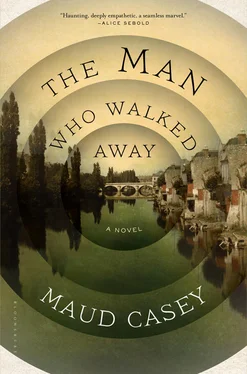With her touch, his white-webbed calluses and his cracked heels begin to soften; with her touch too comes the memory of disbelief. The people he encountered on the road never believed that he was clean even when he said he was. Even the kindest people doubted him. A tailor’s wife who offered him a straw pallet in the back of the tailor’s shop inspected his hands for dirt only to discover immaculate fingernails; a farmer who, though he had eight children, offered him shoes, was shocked to discover the splendid state of Albert’s impeccable feet; a wool merchant who gave him the scraps from his dinner was startled when Albert pulled back his large ears to reveal shining, clean skin. How could he explain to them that even when the roofs were laced with icicles, in the name of cleanliness he would take off his mud-caked pants to wash in a river? That even so he was never immodest. If there were people walking, even far away, even if they were only specks on the horizon, he would hide himself behind a copse of trees. He was clean as often as he could be; if he was not, there was a twitch in his right eye. Too much dirt, and the blood rushed to a place just above that eye and protested, beating there as if his heart had taken up residence in the wrong place.
“It appears I have misspoken,” Albert says. He wants her to know he is grateful. We will help you to remember. She is helping him. “What I meant to say was thank you.”
“No need to thank me,” she says. “But you are welcome.”
There is a scraping and a shuffling at the door.
“What is that?” he asks.
“Only the veteran, eavesdropping,” Nurse Anne says. “Go away, brave man, this is not your room.”
“I was not thinking it was,” a voice says, and then the scraping and shuffling disappear down the hall.
But Albert does not hear. He is as silky as the water. The cleaning of his willing feet he always saved for last; for them he reserved the most special care. He would wait, fighting off the urge to walk as he waited for his shoes to dry by a river or a pond. Only one, or perhaps three, times he discovered himself suddenly in another town without shoes. The first thing he did was run a finger between each toe as if each toe were a tiny loaf of bread, like the ones Albert sometimes discovered left outside behind a bakery to cool; each toe delicious.
The silky water and the caress of Nurse Anne’s hands make him sleepy. But he doesn’t want to wake up in such-and-such a public square or in the cold rubble of the cemetery, so he grips the edges of the chair until his hands ache so he won’t fall asleep and wake up somewhere else entirely. He wants this new life where love isn’t always somewhere else. He wants this new life where he is not merely a man who has appeared out of thin air but a man with a history.
“I am not a vagrant,” he says. Though he had stopped bothering to tell people, it seems necessary to explain to her.
“I never said you were.” The way she doesn’t even look up suggests it was the furthest thing from her mind and then, as if she were a magician, out of her apron pocket she pulls seashells! She places them carefully into his hand. They are still warm from her body and smell of her clean apron and — Albert holds them to his nose — the sea.
“Where did these come from?” he asks.
“My father brought them back to me when I was a child,” she says. “From the Red Sea. He wanted me to see the world.” She leaves out the rest — the way, after he’d shown her all of its wonders, her father had wanted her to leave the world alone; the way he’d insisted she marry her flatulent cousin, shouting, “Who else will have you?” when she refused. How could this be the same father who would joke that she would make a wonderful flâneur , her heart ticking like a clock as she wandered Egypt or Algeria? She keeps herself to herself now, always having considered modesty a virtue, always having believed it to be the secret of one’s own truest love for oneself. She never said to her father, for example, I always thought I would make a fine flâneur ,the same way she never said to the Doctor when he once said to her, “You look like my sister,” that she knew he did not mean a woman with a face more beautiful than his. He meant a woman with his face; he meant his unfortunate sister. This unfortunate sister’s face was the last face a handful of dying soldiers ever saw when she ran away from the flatulent cousin to join the front; to them, she was no unfortunate sister. To them, she was mother, darling, my heart. My heart is what the man who shares her bed now calls her. “We will make a new life,” he said, but when they drank a toast to their new lives she understood the moment was a pair of scissors, cutting her life in two. Half of it left behind in England, the other half yet to come. Once, she met her mother secretly in Budapest and they rode the funicular up into the Buda Hills, the Danube disappearing below them. They strolled arm in arm, making their way tentatively in their high-heeled boots on the cobbled streets. “Come back home,” her mother said, but it was too late. She was already on the other side of the river, far away, looking back on the moment as it happened.
“That was a long time ago,” is all she says.
“The smell of the sea has traveled a long way,” Albert says.
Layers of callused skin drift on the surface of the water in the basin. When she tosses the water into the sewer the river will carry the skin all the way to the ocean. “It’s true,” she says. “The shells carry their past with them.”
How could she know that Albert has wanted nothing more than exactly that, to carry his past with him? She wraps his feet in a towel, holding them against her chest as if they were her babies, patting them dry. “You should rest for a while,” and he hears how tired she is.
“Thank you,” he says again as she leaves, shutting the door behind her. He is so grateful for the tender way she bathed his beloved feet and for letting him hold her Red Sea seashells, a gift from her father whom she clearly misses as dearly as he misses his own.
The scratch of hay he pitched in Aix, the stink of the ceruse factory in Brussels, the not-distant-enough roar of an avalanche somewhere, he cannot remember where, but it doesn’t matter that he can’t remember where because if Albert listens, he returns ; his own father’s voice returns. His father’s face with its sunset scars returns to him. It keeps him still. It keeps him here when he falls asleep in the same bed to the sound of boots on cobblestones just outside his window. In his dreams he wanders off along the tight streets winding past the ancient amphitheater where the gladiators fought, through the ancient gate to the city, the arch underneath the giant clock of the church of St. Eloi as it tolls the hour— les armes, les jours, les heures, l’orage, les fêtes, l’incendie— but then wakes to find he is not somewhere else at all. Instead his mind shrinks from the expansiveness of dreams to fit inside his body as the ordinary world reveals itself to him again — footsteps in the hall; the cry of a young girl—“There are so many. .”—and what there are so many of is swallowed as the girl walks farther and farther away, the bells and then the bells, the sweet, sweet song of bells. And love? It returns to him in glimpses.
He discovered himself once, not knowing how he got there, on a bridge not far from home, and in the water lit by gas jets was the reflection of a strange man, and he knew the strange man was him. “Hello,” he said to himself, who said hello right back. He was no longer the child being scolded by his father for wandering away. Now he was a man whose large eyes were tugged down at the corners by sadness. He broke his own heart. “Help me,” he said, but the sad man only beckoned from the water, Come join me .
Читать дальше












